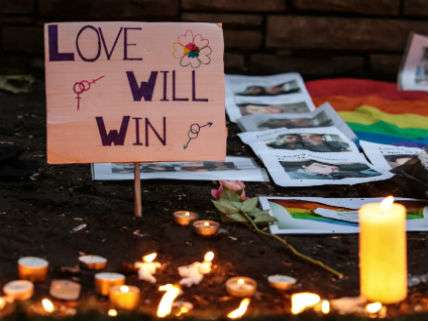Trump and the Terror Vote
Terrorist attacks bolster turnout, but that doesn't tell you whom voters will support

Presumptive Republican presidential candidate Donald Trump has not been shy in pointing out that his poll numbers surge after a terrorist attack either at home or abroad occurs. Trump declares that he will be tough on terrorism, but other than banning Muslims from immigrating to the U.S., he remains resolutely vague on what that might mean.
In March, the stats wizards over at the New York Times'* FiveThirtyEight blog noted that terrorist attacks in San Bernardino and Brussels had apparently bolstered Trump's polling numbers. And in May, Vanity Fair's political correspondent Nick Bilton declared, "You can bet that if any significant national-security threat is posed between now and November, Trump's poll numbers will soar in the same way that Bush's did in 2001. And if that happens, God forbid, I'm willing to bet that he may be the next president of the United States." Well, maybe.
Scholars, however, do generally agree that one of the chief purposes of terrorism is to attract the attention of a bigger audience to their grievances. A 2013 Journal of Peace Research study, "Voters versus Terrorists: Analyzing the Effect of Terrorst Event on Voter Turnout," finds that terrorism does work, at least, with regard to boosting voter turnout. Broadly speaking, the researchers analyze 350 legislative elections in 51 democracies in years when there were terrorist attacks versus years in which there were no attacks. They use two different terrorism datasets; one that focuses on domestic events in Europe and another global one that collects information on both domestic and international attacks. Their analysis spans 1975 through 2004.
The researchers find that the occurrence of an attack or attacks is associated with a 2 percent increase in voter turnout when compared to an election in which there is no terrorist event in the preceding year. If the attacks were non-lethal, voter turnout rose by 1.4 percent, but if lethal, turnout increased by 2.9 percent. They conclude:
Terrorist attacks are threatening and novel political events that lead to anxiety in the electorate, which, in turn, induces individuals to examine the political environment more closely and to attribute greater salience to proximate political event. As a result of this increase in concern and the increased salience of upcoming elections, individuals are more likely to turn out to vote.
So if these social scientists are right, due to terrorist attacks more Americans will vote this year than would otherwise have done so. Still, at least according to FiveThirtyEight today, it remains to be seen how the Orlando atrocity will affect the election this fall.
*More than a bit behind the times. My apologies.


Show Comments (13)